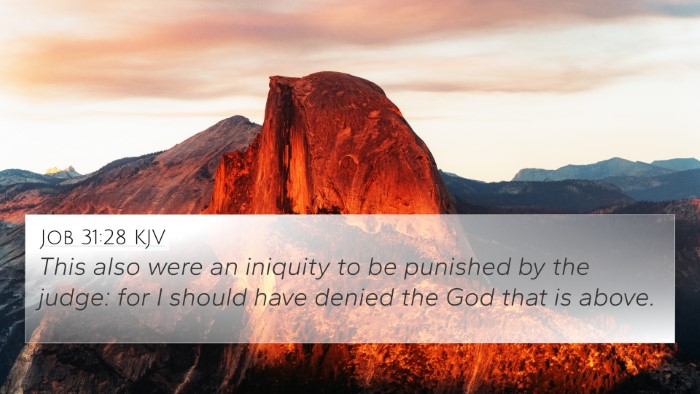Understanding Job 31:11
Job 31:11 (KJV): "For what is our lot from God above, our heritage from the Almighty on high?"
Contextual Overview
The Book of Job presents a profound exploration of suffering, integrity, and faith amidst trials. In this verse, Job is emphasizing the importance of understanding God's justice and the consequences of moral integrity.
Meaning and Interpretation
Commentators such as Matthew Henry, Albert Barnes, and Adam Clarke provide deep insights into Job 31:11. The central theme revolves around moral purity and the fear of God.
Matthew Henry's Commentary
Henry notes that Job is expressing the gravity of sin, especially the sin of adultery, which he categorizes as a serious offense against both God and women. This sin is contrasted with the idea of one’s inheritance from God, emphasizing the spiritual and moral ramifications of such actions.
Albert Barnes' Commentary
Barnes highlights that Job is defending his integrity by asserting that he has not indulged in immoral acts, thus laying claim to the blessings from God. This relates to the theme of divine retribution, where one's actions in life have consequences beyond mere earthly strife.
Adam Clarke's Commentary
Clarke elaborates on the concept of ‘lot’ and ‘heritage’, indicating that Job’s life choices directly affect the blessings bestowed upon him by God. He asserts that moral integrity leads to a closer relationship with God, therefore making it critical for believers to avoid sin.
Bible Verse Cross-References
This verse connects with several others that highlight the consequences of sin and the importance of moral living. The following are related cross-references:
- Proverbs 6:32-33: "But whoso committeth adultery with a woman lacketh understanding: he that doeth it destroyeth his own soul." - This reflects the consequences of immorality.
- 1 Corinthians 6:18: "Flee fornication. Every sin that a man doeth is without the body; but he that committeth fornication sinneth against his own body." - Reinforces the idea of bodily integrity and moral responsibility.
- Galatians 6:7: "Be not deceived; God is not mocked: for whatsoever a man soweth, that shall he also reap." - Highlights divine justice in the context of our actions.
- Matthew 5:28: "But I say unto you, That whosoever looketh on a woman to lust after her hath committed adultery with her already in his heart." - Speaks to the internal aspect of moral purity.
- Psalm 119:9: "Wherewithal shall a young man cleanse his way? by taking heed thereto according to thy word." - Suggests the importance of adhering to God’s word for purity.
- James 1:15: "Then when lust hath conceived, it bringeth forth sin: and sin, when it is finished, bringeth forth death." - Discusses the progression of sin leading to spiritual destruction.
- 1 Thessalonians 4:3: "For this is the will of God, even your sanctification, that ye should abstain from fornication." - Emphasizes God's desire for purity among believers.
Thematic Bible Verse Connections
Job 31:11 encapsulates several themes prevalent throughout Scripture:
- Moral Integrity: Consistent across the Bible, highlighting the importance of living a life reflective of one's faith.
- Consequences of Sin: Several verses discuss the outcomes of sinful behavior, aligning with Job’s acknowledgment of moral implications.
- Divine Justice: The theme of God's justice resonates in many scriptures, reinforcing the need for believers to heed God's commands.
Conclusion
In Job 31:11, Job's declaration about maintaining his integrity serves as a vital reminder for all believers regarding the significance of moral conduct. The discussions by prominent biblical commentators provide clarity and illustrate the depth of understanding that can be attained through cross-referencing Bible verses.
This verse invites reflection on individual conduct and the divine principles that govern both earthly and spiritual inheritances. Engaging with the connections between scripture enhances comprehension and cultivates a deeper relationship with God.
Tools for Bible Cross-Referencing
For those seeking to explore similar verses or themes, there are various tools for Bible cross-referencing available, including Bible concordances, cross-reference guides, and systematic methods of cross-referencing for in-depth study.












